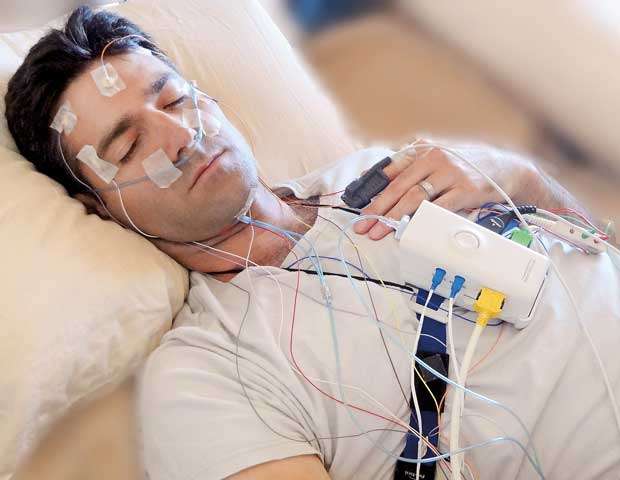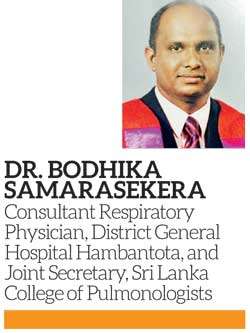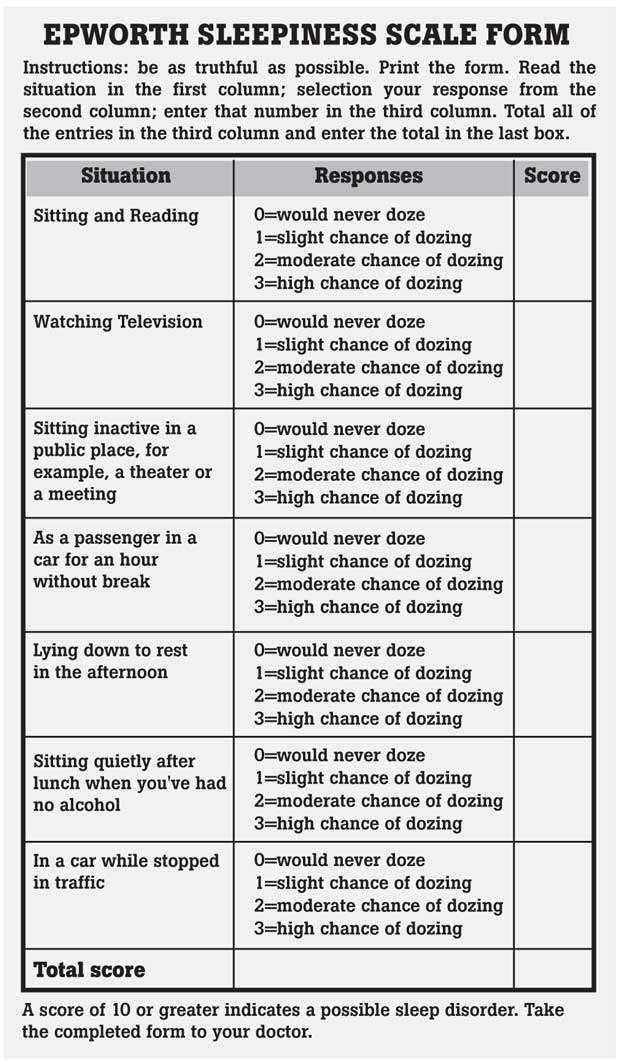13 Jul 2018 - {{hitsCtrl.values.hits}}

 In last week’s article, we talked about how snoring could affect your life, from it interfering with the spouse’s sleep to being a condition which is called Obstructive Sleep Apnoea; which causes serious consequences to your health. As we continue with the interview with Dr Bodhika Samarasekera, Consultant Respiratory Physician, District General Hospital Hambantota, and Joint Secretary, Sri Lanka College of Pulmonologists, we will talk about when you should see a doctor and what the treatment options are. We have also provided you with an internationally standardized questionnaire where you can self assess how sleepy you are feeling on average and decide for yourself if you need
In last week’s article, we talked about how snoring could affect your life, from it interfering with the spouse’s sleep to being a condition which is called Obstructive Sleep Apnoea; which causes serious consequences to your health. As we continue with the interview with Dr Bodhika Samarasekera, Consultant Respiratory Physician, District General Hospital Hambantota, and Joint Secretary, Sri Lanka College of Pulmonologists, we will talk about when you should see a doctor and what the treatment options are. We have also provided you with an internationally standardized questionnaire where you can self assess how sleepy you are feeling on average and decide for yourself if you need
medical attention.
Seeking medical help
Many people may not consider snoring to be a sign of something potentially serious. Even though everyone who snores doesn’t have obstructive sleep apnoea, you may need to talk with your doctor if you have loud snoring that disturbs your sleep or that of others and especially if this condition is present when sleeping during the daytime, advises Dr. Samarasekera.
An example for excessive daytime sleepiness is when you fall asleep in the middle of an important meeting, when watching TV or sometimes even when you are driving. Daytime drowsiness may also be due to several other reasons such as low thyroxin hormone levels in your blood (Hypothyroidism) and a condition called narcolepsy. Hence it is very important to see your doctor if you have these symptoms.
At the doctor’s
When you visit a doctor and present with these symptoms he will ask you a set of questions and calculate the severity by giving marks to each question. Then he will calculate your body mass index (BMI) by measuring your height and weight. Furthermore your collar size and the blood pressure will be measured. In addition, the back of the throat, mouth and nose will be examined for extra tissues or any abnormality. There are several questionnaires that doctors can use as initial assessment tools to screen these patients. Epworth sleepiness scale is one of the commonly used tools (set of questions) by doctors and we have provided you with the questionnaire to self asses and get some idea of your sleeping problem.
After the initial screening, if you have symptoms suggestive of sleep apnea your doctor will refer you to a sleep specialist for further evaluation and a sleep study. This sleep evaluation may involve overnight monitoring of your breathing, oxygen level, snoring intensity and several other functions while you sleep.
A full sleep study is called polysomnography. During this study you will be attached to an instrument that monitors your breathing pattern, blood oxygen level and arm and leg movements while you sleep. In addition your heart, lung and brain activity will also be assessed during sleep. You also will be video monitored. This full sleep study can diagnose Obstructive Sleep Apnoea and can also exclude other sleep disorders. These studies can be done currently at National Hospital for Respiratory Diseases Welisara, Central Chest Clinic Colombo, National Hospital Sri Lanka, Teaching Hospital Kandy and a few other centres in Sri Lanka. However, now there are some limited sleep studies which can be arranged at your home. These studies will measure your airflow, breathing and blood oxygen levels. This test is usually enough to diagnose obstructive sleep apnoea. These limited sleep studies are now available at many respiratory units and clinics in Sri Lanka including District General Hospital Hambantota.
Treatment
The process of treatment depends on the severity of the disease. Usually, lifestyle changes alone will be helpful in managing a minor degree of Obstructive Sleep Apnoea.
First and foremost, you need to lose your weight through proper dietary control and regular exercise. Hence you may be referred to a clinical nutritionist for a better lifestyle management plan. Alcohol intake should be reduced and you may also have to quit smoking. In addition, you may have to use nasal decongestions and anti allergic medications if you have symptoms of allergic rhinitis, where you get a blocked nose due to allergens like pollen or dust in the air.
If you have OSA, it is very important to avoid sleeping on your back, since this can cause the tongue and the soft palate to rest against the back of your throat and block the air way. Therefore it is always advisable to sleep on your side or on the abdomen than your back.
In western countries, doctors advice patients to keep a tennis ball on the back of their pajama top to prevent them from sleeping on their backs.
If these measures fail to improve symptoms or if you have moderate to severe obstructive sleep apnea you will be referred for advanced management. Most patients with moderate to severe Obstructive Sleep Apnoea are on a device called the CPAP machine which delivers positive air pressure through kind of a mask that fits over your nose and mouth or over your nose while sleeping. You have to wear this mask overnight and the positive airway pressure, which is delivered by the machine, will reduce the airway from narrowing and the number of respiratory events
as you sleep.
Hence it will reduce daytime sleepiness and improve the quality of life. If these measures also fail or in the case of any obvious upper airway obstruction you may be referred to ENT surgeons or OMF surgeons for surgical management.
Word of advice
“Snoring may be normal in most people. However if you have day time sleepiness, morning headaches, or complications that were previously mentioned, get medical advice. This will go a long way towards improving the quality of your life”, is Dr. Samarasekera’s final advice to our readers.

22 Dec 2024 3 hours ago
22 Dec 2024 3 hours ago
22 Dec 2024 6 hours ago
22 Dec 2024 6 hours ago
22 Dec 2024 6 hours ago